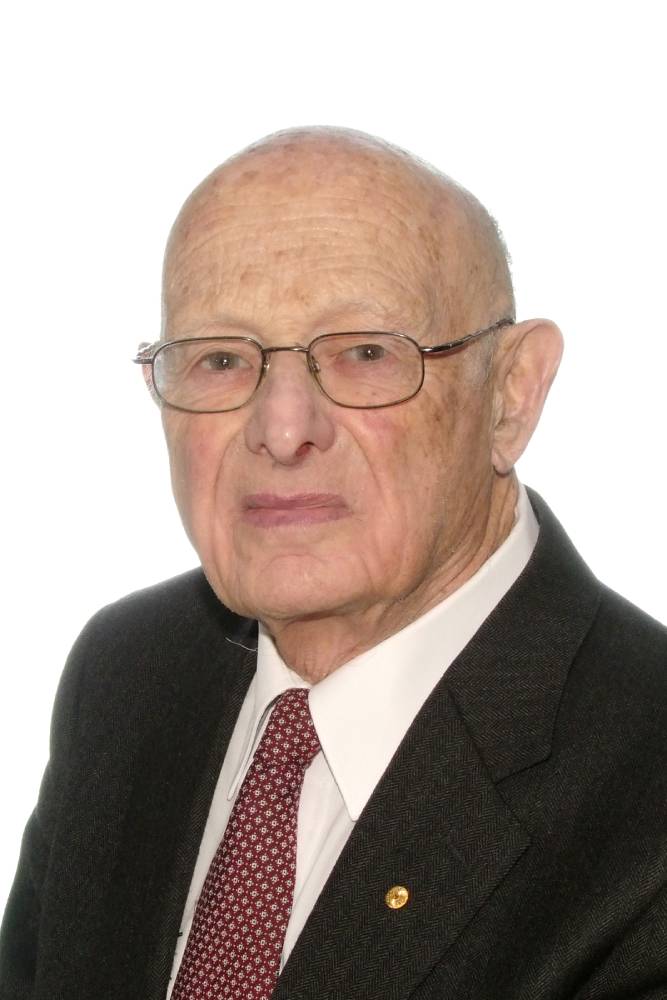Jubilee Fellow – 2017

Professor Max Corden AC
MCom (Melbourne), PhD (London), MA (Oxford), HonDCom (Melbourne), FBA
Discipline: Economics
Year Elected: 1977
2017 Reflections
In 1977 I returned to the ANU after nine years in Oxford, and in this year I was elected to a Fellowship in the Academy. After another nine years I moved on to the United States, briefly to the International Monetary Fund and then, for 13 years, to the School of Advanced International Studies (SAIS) of Johns Hopkins University.
(1) What difference did membership of the Academy make to my research work?
I focus here on those ANU nine years from 1977 to 1986. Meetings of the Academy gave me an opportunity to meet academic colleagues, which was necessary because of my nine years’ absence from Australia. I particularly valued meeting non-economists (sociologists and political scientists) whom I would not have met otherwise. Regularly attending the annual meetings of the Academy was both enjoyable and useful, indeed broadening.
In this ANU period I had two main research topics, The first one was the theory of Dutch Disease, highly relevant to Australia but also to many other countries. This was a big new topic, though I had already started on it in Oxford, and it led to some high-citation articles. I did not need the Academy for this. I arrived in Australia highly motivated to continue the work, which was of international interest.
The second topic involved very current Australian macroeconomic issues, namely the appropriate economic policy in the presence of a wages explosion or (arguably) excessive trade union pressure. I was elected President of the Economic Society of Australia and gave a controversial Presidential Address on this hot subject. I argued, along with some others, that excessively high real wages caused excessive unemployment. With regard to the role of the Academy all I can say is that with such a controversial subject the more people one talks with the better.
Being based in Canberra and at the ANU I had possibly only a modest need for the role of the Academy as a place to meet colleagues in my field, but that is not true for many other Australian academics who are not lucky to be located so centrally. Basically I was very privileged and the national value of meetings of the Academy to encourage interaction between professionals in our fields is very high.
(2) The Big Issues. What were my Research contributions and what am I most proud of?
Big questions requiring long answers! Here it is convenient that I have been spending a whole year, and more, in writing my autobiography. The autobiography covers my life, both personal and academic, from my age 6 to age 75. It is comprehensive and does ask exactly such academic questions. In places I am very critical of my earlier work. I systematically review the various academic stages of my life.
The autobiography should be published by Palgrave-Macmillan, UK by the end of this year. It is quaintly called lucky boy in the lucky country (a title I chose). It is not just the story of an academic but that of a refugee and an immigrant. But it is the various stories of an academic writer and policy commentator that are relevant for this Academy essay.
One aspect I will elaborate on here. What has motivated me in choosing my research topics? Here the broad answer is that my theory work is always motivated by what is happening in the world and especially in Australia. I want to clarify events and issues. Even when I have lived outside Australia I have been heavily motivated by Australian issues. That is how I launched into the theory of protection on which I ended up writing two books in Oxford. It is here that I have for a limited period, influenced Australian policies and elite thinking. In my autobiography I have two extensive chapters on this. Finally, I put heavy emphasis on the quality of exposition. I aim for clarity and simplicity rather than advocacy or complexity.
Finally, what am I especially proud of? Over my life-time I have published five economics books, not including three that are collections of articles. One of the books, Trade Policy and Economic Welfare, has been a success based on sales and citations. But I am really proud of another book. This is only 170 pages and is entitled Inflation, Exchange Rates and the World Economy, OUP 1977. It has gone into three editions, and had plenty of favourable reviews. It explains really clearly lots of issues of importance. Whenever I re-read it I like it, and wish my other books were written like that.
